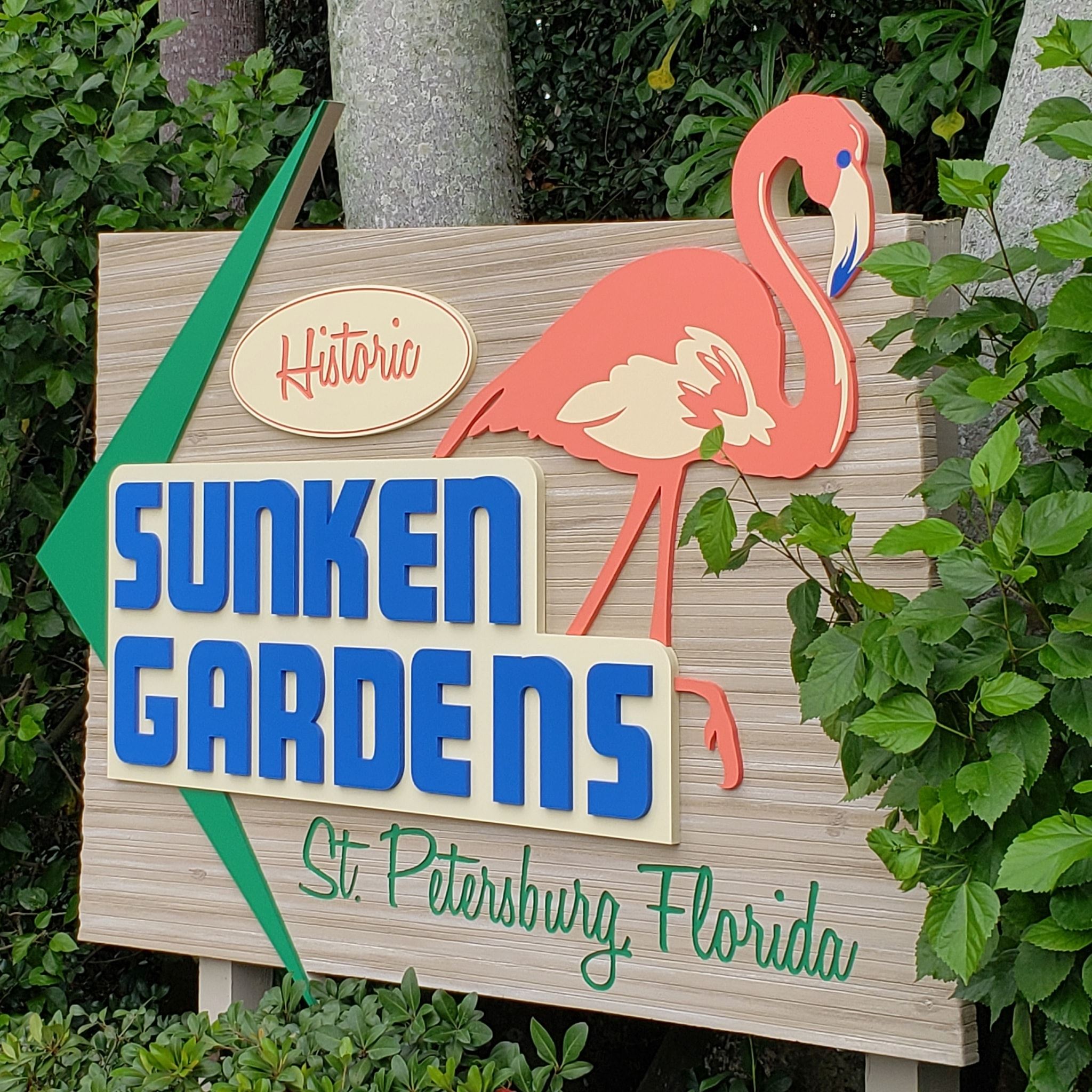Downtown St. Petersburg is going through some changes. The St. Pete Pier construction is finally finished. Rapid transit is being added. The entire southern waterfront is soon to be revitalized. However, Sunken Gardens remains an oasis of calm in the middle of a busy downtown. Learn about the Sunken Gardens history and how the four acres of gorgeous flora and fauna will remain in the heart of St. Pete for years to come.
From relaxing hobby to roadside attraction
The gardens once belonged to one man — George Turner, Sr. A plumber by trade, he also had a passion for gardening. In 1922, he purchased six acres that would one day become a world famous roadside attraction. In order to create the winding garden maze we know today, he had to drain an ancient lake. This left a rich, mucky soil — ideal for tropical flowers and fruiting trees. His wife, Eula Turner, also had a love for plants and played a large role in establishing the gardens as a landmark.
Sunken Gardens through the years

A brochure advertising the tourist attractions in Florida’s “Fun Triangle.” There is a map of the triangle and a list of attractions with their locations. 1966 
Entrance to Sunken Gardens 1976. 
Advertisement for the Sunken Gardens attraction in Saint Petersburg, Florida, 1969 
Postcard of Ladies walking a path bordered by brilliant azaleas at Sunken Gardens.
By the 1920s, Turner had enough plants to start a nursery. He began selling fruits, vegetables, and plants. In the 1930s, the gardens became a popular place for neighbors to go for a stroll. Eventually, the Turners charged a nickel for tours. By 1935, he had to fence in his garden and start charging 24-cents for admission. The rise possibly because of Depression-era inflation.
In the 1950s, the Gardens were officially in their roadside attraction era. Along with the actual botanical gardens, visitors could now see capybaras, alligator wrestling, “The World’s Largest Gift Shop,” and, of course, flamingos. An original flock of 17 flamingos came to roost in 1956. These pink birds became a trademark of Sunken Gardens and drew in even more tourists. In 2016, dedicated volunteers and their non-profit group bought a new young flock from San Antonio Zoo.
Miss Florida Pageant, 1947. Held at Sunken Gardens

Mary Letts performing a Latin dance number in the Miss Florida Pageant 1947 
Contestants being judged during the evening gown part of the pageant. 
Laurel Norden, Miss Winter Haven 1947, at the 1947 Miss Florida Pageant 
Jean Duket dancing during the talent part of the 1947 Miss Florida Pageant 
Judges and contestants from the Miss Florida Pageant 1947
From the 1970s on, organizations ranked the Gardens as one of Florida’s best roadside attractions. Turner died in 1961 and passed the Gardens onto his sons, who passed it on to their sons. The Gardens were eventually sold to the city of St. Pete in 1999.
A gem of the city
The city purchased Sunken Gardens with funds from a voter-approved tax. The nearby building, know as the Sanitary Public Market, also came with the purchase. The Sanitary Public Market was constructed in 1927. It was a Mediterranean Revival style arcade. In 1940, it was converted for use as the Coca-Cola Bottling Company. In 1967, the Turner family purchased the building to create the “World’s Largest Gift Shop” and the King of Kings Wax Museum. After the city purchased it, the building and the Gardens were designated as a local historic landmark and treated to several years’ efforts of restoration.
Sunken Gardens through the years
The Gardens have become so much more than, well, a garden. People get married there. Amateur photographers improve their nature photography-taking skills. This past year there was a Cinco de Mayo fiesta. Tons of horticultural and education programs are offered year-round to both children and adults.
Over 100 years later, Sunken Gardens remains a tranquil oasis nestled in the heart of St. Pete. It’s a place where visitors can go to escape the hustle and bustle of downtown and locals can go to take advantage of cultural and educational opportunities.
More Hidden History stories on Modern Globe


































